A lot of people might describe Mary Regan’s journey in agriculture as unique or inspiring.
But to this Wexford woman, farming is simply what she has always known; and what she has always wanted to do.
“I don’t think of it [as work], because that’s what I’ve done and that’s what I love doing,” she reflects, “but I suppose I’ve grown up with it.
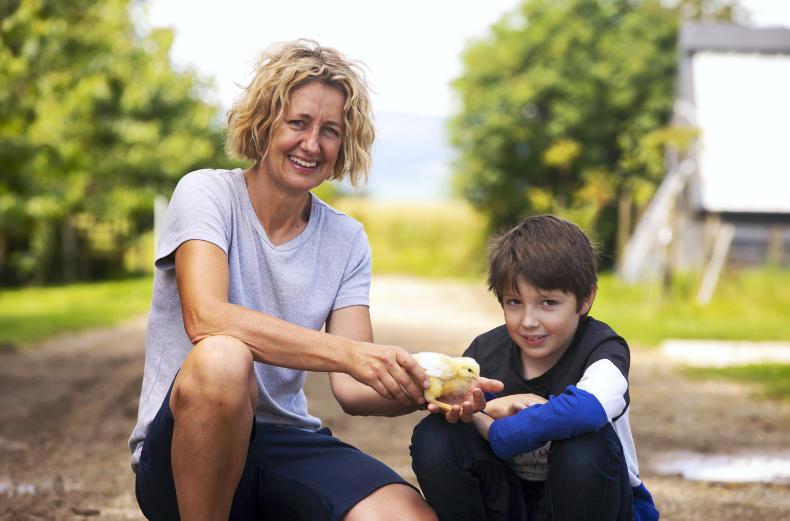
Mary O'Regan with her son Tom at O'Regan's organic farm near Enniscorthy. \ Patrick Browne
“I don’t mind the challenges. I’m very capable, I’m used to hardship and used to multi-tasking. You could be doing one thing one minute and another the next, women are good at that too.
“You can go in and have a meeting with somebody that’s important for the business; and the next minute you can come home and you’re in your overalls feeding pigs down the field.”
And perhaps it’s that attitude that has seen Mary transform the 46-acre conventional suckler and sheep farm that was struggling to survive to a thriving organic poultry and pig enterprise with its own abattoir and visitor centre.
Father to daughter
Mary’s farm lies approximately 6km outside of Enniscorthy. It was originally the birthplace of her grandmother and farmed by her grandaunts, but later inherited by her father, Tom, and her mother, Kitty.
While Mary was not reared on the farm itself, she was there with her dad any chance she got.
“From the time I can remember, I was always in the car with him going to the farm,” she recalls, explaining how her father kept a breeding flock of ewes, reared beef and also grew sugar beet and cereals.
“I followed him around all day – I loved being outdoors, loved being with animals, growing things even. So anything to do with nature, I just loved it.”
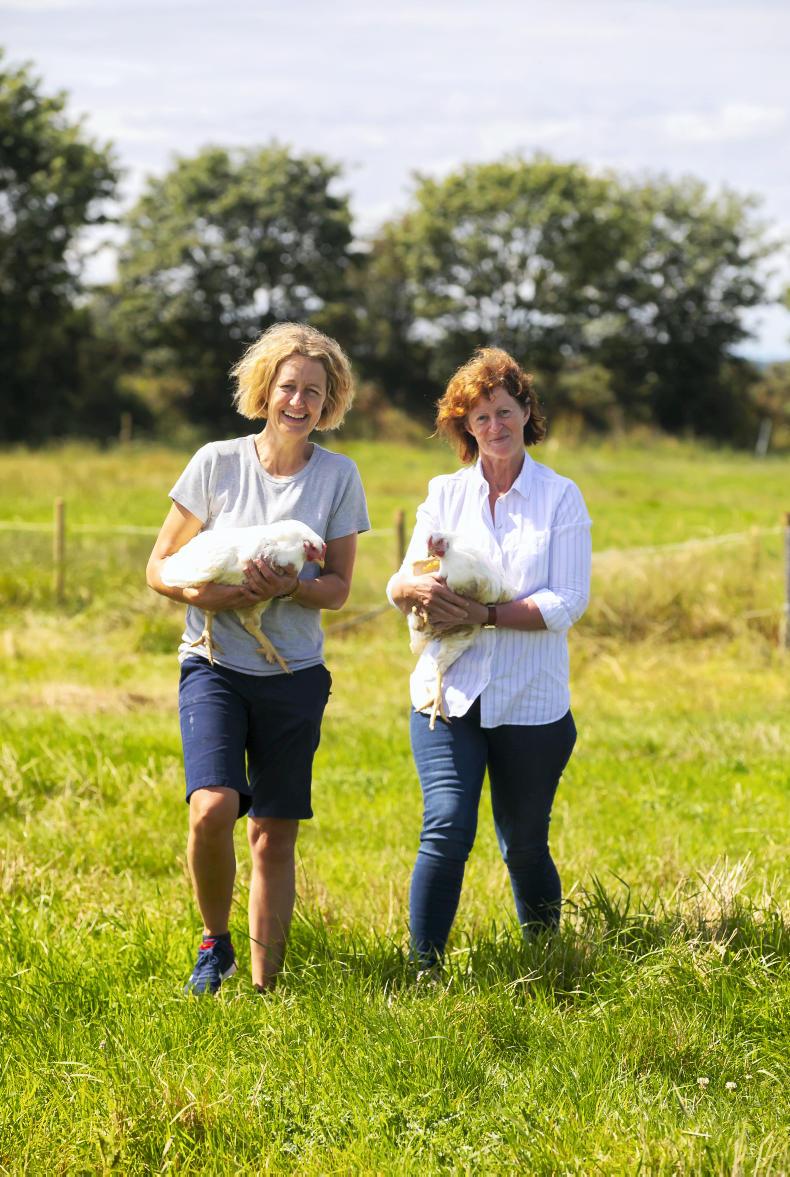
Mary O’Regan with her sister Helen at O'Regan's organic farm near Enniscorthy. \ Patrick Browne
Indeed, Mary says that if the enterprise had been big enough to support both her parents and herself, she would have gone straight into farming from school, but instead studied agricultural science in UCD and worked off-farm while helping her father in her spare time. In the mid-90s, however, Mary inherited the farm from her dad.
“There was never any issue,” she says of the smooth succession. “I was always the one that was interested in it and my sisters had taken other paths in life: one was a solicitor, one was a teacher and my other sister then worked in a pharmacy. That was it.”
Sadly, Mary’s father passed away in 1997 after a short illness. By then, Mary had started to make some changes to the enterprise, selling the flock of ewes as “there was more work in them than what we were getting out of them”, though the collapse in the price of beef also saw income take a “battering”.
To stay afloat financially, she continued to work off-farm – at that stage with Morrin’s Animal Feeds, looking after sales and nutrition for the south-east. Around that time, the company started to make organic feed and she was given the remit to develop the market.
But this would prove a turning point in her own farming journey.

“It was the first time I had ever been exposed to anything in organics and I liked what I saw,” she explains. “So I looked at my own farm and said, ‘This is something that I’d like to do’.”
After doing her research and starting the two-year organic conversion period in 2004, Mary felt that there was potential to convert to poultry and pigs; despite the fact that she had no experience in either sector or significant money to invest.
However, she converted some old outbuildings to get going and started small, though even sourcing day-old chicks at the start was a challenge, as the bigger hatcheries considered her orders “a nuisance”.
But what gave her the confidence to continue was the reaction from customers at the local farmers’ market.
“The comments back from people like, ‘Your chicken tastes like chicken used to taste like’,” recalls Mary. “That gave us the confidence to say, ‘Look what I’m doing here is right and I want to develop it’.”
Facing challenges
And as word of mouth spread, sales grew, not just locally, but to shops as far as Cork and Dublin. To meet demand, Mary decided to invest in secondhand mobile poultry houses, but in 2014 was faced with a huge setback when the abattoir she had been using closed.
She explains that as her numbers were still relatively small, bigger processors “wouldn’t entertain” breaking their production lines for her birds, while finding a factory with organic certification was also an issue.
So?
“I had to make a decision where I was either going to forget about the business and call it a day or go and set up our own abattoir, so again – reluctantly at the start – I went back to the bank looking for money,” says Mary, who liaised with the local council vet and the Food Safety Authority of Ireland (FSAI) on her plans, as well as availing of some grant aid under the organic scheme to complete the build.

\ Patrick Browne
Ultimately, she estimates that the entire project cost the guts of €140,000, which was a “huge risk” at the time; but one she has never regretted.
“In hindsight now, it’s probably the best thing we did, because it’s given us full traceability of our birds and full control over everything,” says Mary, who now produces between 700-800 chickens a week at peak times, which are sourced as day-old chicks and reared organically over 12 weeks until selected for processing.
She favours the Ross bird – a “good, meaty breed” – which typically weighs 1.8kg minimum once reared and retails at between €16-€19 in shops; but goes a long way in a rural household.
“People like to have the dinner on a Sunday and have enough left over then for the sandwiches or the curry on Monday evening and use the carcase then for soup or stock,” she says.
“They use every bit of it.”
Diversification
As well as chickens, Mary produces Aylesbury ducks for both the table and for eggs.
She also keeps traditional breeds of pigs – including Tamworths, Saddlebacks and Gloucester Old Spots – but explains that the market for organic pork has been harder to crack.
“The difficulty with the pig is nobody wants a full pig,” she explains. “People want the loins and then what do you do with the belly?”
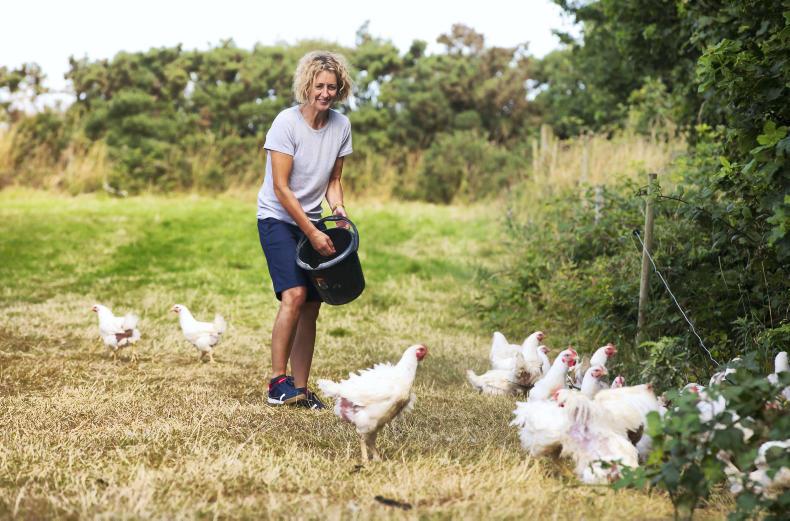
\ Patrick Browne
That said, she recently worked with Avoca, who were happy to take in the full pig, and they hope to do further trials and costings together.
In addition, Mary also grows cereals – such as oats for Flahavan’s – as it fits into her rotation system and she has also developed a small visitor centre for group farm tours as well as an “honesty fridge” where members of the public can buy her products, or shop online.
She feels that such diversification is necessary to survive as a small organic farm.
“I suppose some people think, ‘God the price of organic chickens, you must be raking in the money’ or whatever.
“It is a very difficult business because there are a lot of things that can have a huge effect on your business and I suppose there’s an old saying: Don’t put all your eggs in the one basket,” says Mary.
However, she has a very loyal client base, from individual customers to stockists such as Ardkeen Quality Food Store in Waterford, Whelan’s Butchers, Donnybrook Fair and Pettitts’ Super Valu stores, as well as restaurants and hotels.
This has led to the creation of jobs on the farm, with Mary’s husband David and her sisters Helen and Ger all involved, as well as other staff.
Like we said at the very start, it’s a journey that is both unique and inspiring. But for Mary, it’s just about doing what she loves.
“There’s no way starting back then would I have foreseen to be at the level we’re at,” she says.
“The demand is there.”
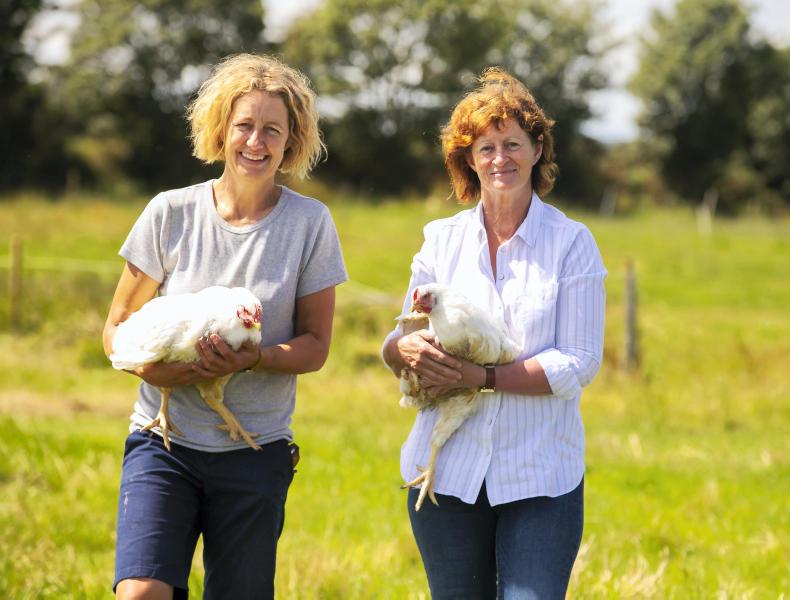
Mary O’Regan pictured with her sister Helen. \ Patrick Browne
For further information, visit
www.reganorganicfarm.ie
A lot of people might describe Mary Regan’s journey in agriculture as unique or inspiring.
But to this Wexford woman, farming is simply what she has always known; and what she has always wanted to do.
“I don’t think of it [as work], because that’s what I’ve done and that’s what I love doing,” she reflects, “but I suppose I’ve grown up with it.

Mary O'Regan with her son Tom at O'Regan's organic farm near Enniscorthy. \ Patrick Browne
“I don’t mind the challenges. I’m very capable, I’m used to hardship and used to multi-tasking. You could be doing one thing one minute and another the next, women are good at that too.
“You can go in and have a meeting with somebody that’s important for the business; and the next minute you can come home and you’re in your overalls feeding pigs down the field.”
And perhaps it’s that attitude that has seen Mary transform the 46-acre conventional suckler and sheep farm that was struggling to survive to a thriving organic poultry and pig enterprise with its own abattoir and visitor centre.
Father to daughter
Mary’s farm lies approximately 6km outside of Enniscorthy. It was originally the birthplace of her grandmother and farmed by her grandaunts, but later inherited by her father, Tom, and her mother, Kitty.
While Mary was not reared on the farm itself, she was there with her dad any chance she got.
“From the time I can remember, I was always in the car with him going to the farm,” she recalls, explaining how her father kept a breeding flock of ewes, reared beef and also grew sugar beet and cereals.
“I followed him around all day – I loved being outdoors, loved being with animals, growing things even. So anything to do with nature, I just loved it.”

Mary O’Regan with her sister Helen at O'Regan's organic farm near Enniscorthy. \ Patrick Browne
Indeed, Mary says that if the enterprise had been big enough to support both her parents and herself, she would have gone straight into farming from school, but instead studied agricultural science in UCD and worked off-farm while helping her father in her spare time. In the mid-90s, however, Mary inherited the farm from her dad.
“There was never any issue,” she says of the smooth succession. “I was always the one that was interested in it and my sisters had taken other paths in life: one was a solicitor, one was a teacher and my other sister then worked in a pharmacy. That was it.”
Sadly, Mary’s father passed away in 1997 after a short illness. By then, Mary had started to make some changes to the enterprise, selling the flock of ewes as “there was more work in them than what we were getting out of them”, though the collapse in the price of beef also saw income take a “battering”.
To stay afloat financially, she continued to work off-farm – at that stage with Morrin’s Animal Feeds, looking after sales and nutrition for the south-east. Around that time, the company started to make organic feed and she was given the remit to develop the market.
But this would prove a turning point in her own farming journey.

“It was the first time I had ever been exposed to anything in organics and I liked what I saw,” she explains. “So I looked at my own farm and said, ‘This is something that I’d like to do’.”
After doing her research and starting the two-year organic conversion period in 2004, Mary felt that there was potential to convert to poultry and pigs; despite the fact that she had no experience in either sector or significant money to invest.
However, she converted some old outbuildings to get going and started small, though even sourcing day-old chicks at the start was a challenge, as the bigger hatcheries considered her orders “a nuisance”.
But what gave her the confidence to continue was the reaction from customers at the local farmers’ market.
“The comments back from people like, ‘Your chicken tastes like chicken used to taste like’,” recalls Mary. “That gave us the confidence to say, ‘Look what I’m doing here is right and I want to develop it’.”
Facing challenges
And as word of mouth spread, sales grew, not just locally, but to shops as far as Cork and Dublin. To meet demand, Mary decided to invest in secondhand mobile poultry houses, but in 2014 was faced with a huge setback when the abattoir she had been using closed.
She explains that as her numbers were still relatively small, bigger processors “wouldn’t entertain” breaking their production lines for her birds, while finding a factory with organic certification was also an issue.
So?
“I had to make a decision where I was either going to forget about the business and call it a day or go and set up our own abattoir, so again – reluctantly at the start – I went back to the bank looking for money,” says Mary, who liaised with the local council vet and the Food Safety Authority of Ireland (FSAI) on her plans, as well as availing of some grant aid under the organic scheme to complete the build.

\ Patrick Browne
Ultimately, she estimates that the entire project cost the guts of €140,000, which was a “huge risk” at the time; but one she has never regretted.
“In hindsight now, it’s probably the best thing we did, because it’s given us full traceability of our birds and full control over everything,” says Mary, who now produces between 700-800 chickens a week at peak times, which are sourced as day-old chicks and reared organically over 12 weeks until selected for processing.
She favours the Ross bird – a “good, meaty breed” – which typically weighs 1.8kg minimum once reared and retails at between €16-€19 in shops; but goes a long way in a rural household.
“People like to have the dinner on a Sunday and have enough left over then for the sandwiches or the curry on Monday evening and use the carcase then for soup or stock,” she says.
“They use every bit of it.”
Diversification
As well as chickens, Mary produces Aylesbury ducks for both the table and for eggs.
She also keeps traditional breeds of pigs – including Tamworths, Saddlebacks and Gloucester Old Spots – but explains that the market for organic pork has been harder to crack.
“The difficulty with the pig is nobody wants a full pig,” she explains. “People want the loins and then what do you do with the belly?”

\ Patrick Browne
That said, she recently worked with Avoca, who were happy to take in the full pig, and they hope to do further trials and costings together.
In addition, Mary also grows cereals – such as oats for Flahavan’s – as it fits into her rotation system and she has also developed a small visitor centre for group farm tours as well as an “honesty fridge” where members of the public can buy her products, or shop online.
She feels that such diversification is necessary to survive as a small organic farm.
“I suppose some people think, ‘God the price of organic chickens, you must be raking in the money’ or whatever.
“It is a very difficult business because there are a lot of things that can have a huge effect on your business and I suppose there’s an old saying: Don’t put all your eggs in the one basket,” says Mary.
However, she has a very loyal client base, from individual customers to stockists such as Ardkeen Quality Food Store in Waterford, Whelan’s Butchers, Donnybrook Fair and Pettitts’ Super Valu stores, as well as restaurants and hotels.
This has led to the creation of jobs on the farm, with Mary’s husband David and her sisters Helen and Ger all involved, as well as other staff.
Like we said at the very start, it’s a journey that is both unique and inspiring. But for Mary, it’s just about doing what she loves.
“There’s no way starting back then would I have foreseen to be at the level we’re at,” she says.
“The demand is there.”

Mary O’Regan pictured with her sister Helen. \ Patrick Browne
For further information, visit
www.reganorganicfarm.ie










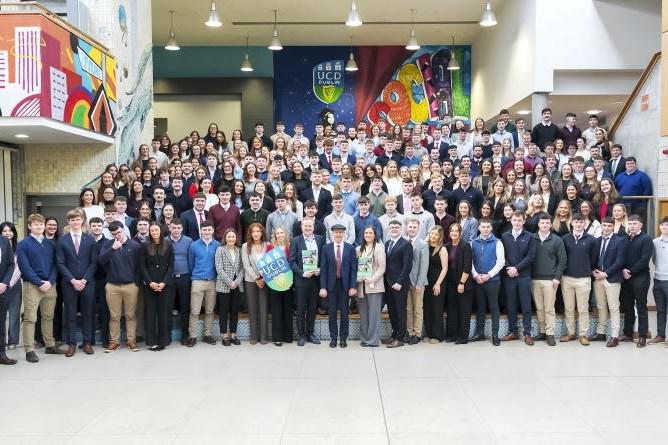
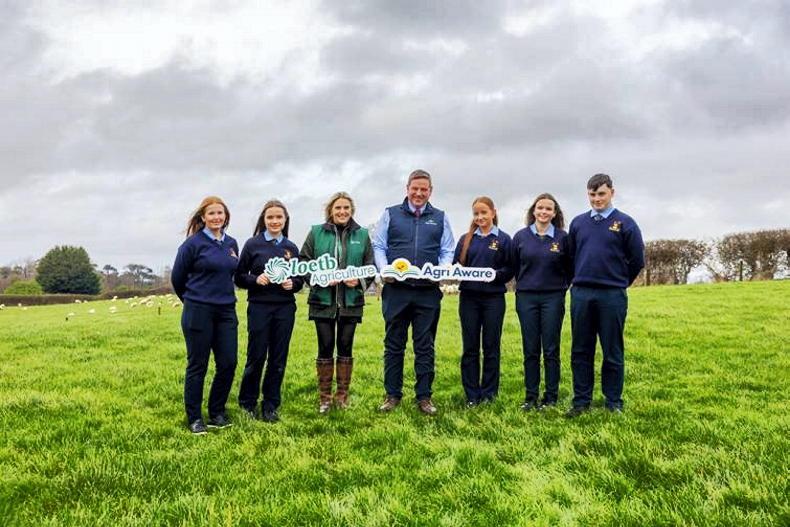
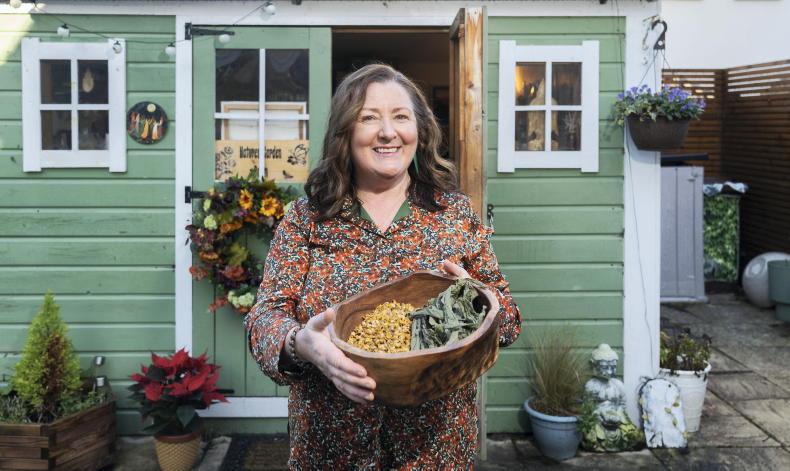
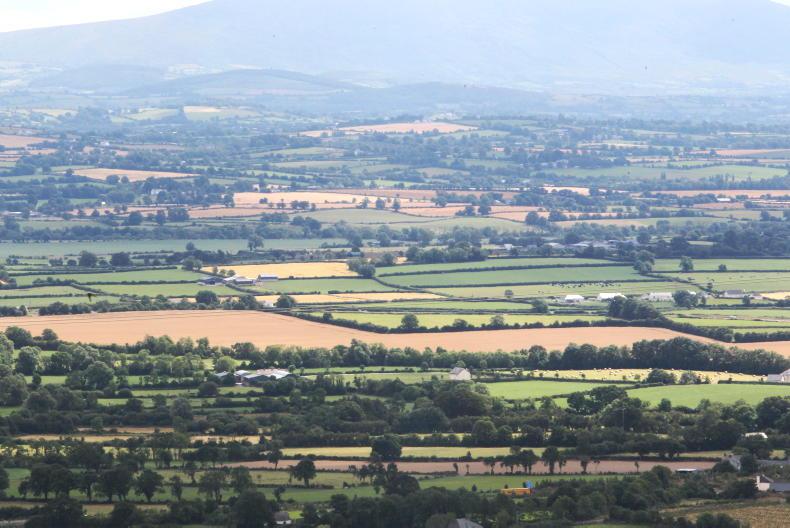
SHARING OPTIONS